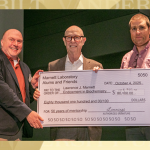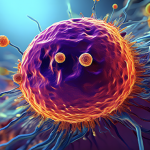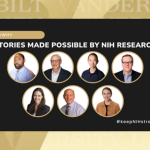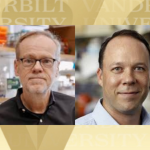Uncategorized
2025 Fall Staff Assembly honors individuals and teams for excellence in leadership and innovation
Oct. 30, 2025—Chancellor Daniel Diermeier and Vice Chancellor of People, Culture and Belonging Sydney Savion presented awards at the 2025 Fall Staff Assembly to a mix of inspiring individuals and teams who have made significant contributions through their community engagement, research and service.
Biomedical research presenters shine at national meeting
Oct. 28, 2025—
Marnett trainees toast 50 years of science
Oct. 28, 2025—In a heartwarming tribute to a remarkable career, more than 70 of his graduate students and postdoctoral scholars recently traveled from across the globe for a three-day celebration of Larry Marnett’s 50 years in academia. Marnett’s trainees surprised him with an endowment in his honor designated to support programs for trainees in the Department of...
Learning the language of lasso peptides to improve peptide engineering
Oct. 16, 2025—In the hunt for new therapeutics for cancer and infectious diseases, lasso peptides prove to be a catch. Their knot-like structures afford these molecules high stability and diverse biological activities, making them a promising avenue for new therapeutics. To better unleash their clinical potential, a team from the Carl R. Woese Institute for Genomic Biology...
The emperor of all oncogenes
Oct. 16, 2025—By pioneering a unique strategy to make the long-undruggable MYC protein vulnerable, William Tansey (Cell and Developmental Biology) and Stephen Fesik (Biochemistry) are rewriting the playbook for defeating cancer.
Spraggins awarded $4M NSF grant to develop next-generation molecular imaging platform
Oct. 15, 2025—Jeff Spraggins, director of the Mass Spectrometry Research Center and associate professor of cell and developmental biology, has received a $4 million National Science Foundation Major Research Instrumentation award to develop a groundbreaking molecular imaging system.
Vanderbilt research looks to smooth out bumps in medicinal chemistry processes
Oct. 3, 2025—The lab of Doug Mitchell (Biochemistry) recently reconstituted and characterized a versatile tryptophan halogenase. Improving the field’s understanding of this enzyme brings it a step closer to seeing use as a biocatalytic tool in basic and translational research.
Faculty share their “why,” spotlighting NIH-funded research
Sep. 25, 2025—Vanderbilt faculty joined United for Medical Research’s MyWHY campaign by answering a simple but powerful question: Why is medical research important to you? Their stories revealed the people, experiences, and motivations behind their work, all while underscoring the role that funding from the National Institutes of Health plays in every breakthrough.
Vanderbilt-Ingram Cancer Center names Tansey, Kojetin to leadership team
Sep. 25, 2025—The Vanderbilt-Ingram Cancer Center named William Tansey (Cell and Developmental Biology) and Doug Kojetin (Biochemistry) to leadership roles. Tansey will be the associate director for Shared Resources and Kojetin will be co-leader of the Genome Maintenance Research Program.
NCI grant funds $12 million for colorectal cancer research
Sep. 18, 2025—A colorectal cancer research team including Robert Coffey (Cell and Developmental Biology), Stephen Fesik (Biochemistry), Ken Lau (CDB), and Bill Tansey(Biochemistry) has received a $12.6 million Specialized Programs of Research Excellence grant renewal. The team has made numerous discoveries over the past 23 years and plans to build upon those achievements with the goal of...









